Beetroot biscuits are a colorful, nutritious choice for your toddler's snack time. Infused with organic beet powder, they offer natural sweetness and vibrant color, making healthy eating fun. Packed with essential nutrients like fiber and iron, these biscuits help support your child's growth and digestive health. Plus, they're free from artificial flavors, keeping snack time wholesome. Easy to store and perfect for on-the-go, you can pair them with dips like yogurt or hummus for added variety. Want to explore even more exciting snack options that promote health and happiness for your little one? Stick around for tasty ideas!
Key Takeaways
- Beetroot biscuits are a nutritious, tasty snack for toddlers, infused with organic beet powder for natural sweetness and vibrant color.
- High in fiber and essential nutrients, beetroot biscuits support healthy growth and digestion while satisfying sugar cravings without refined sugars.
- Convenient resealable packaging allows for on-the-go snacking, making beetroot biscuits an easy addition to diaper bags or lunch boxes.
- Pair beetroot biscuits with yogurt or hummus for creative, nutritious dipping options that enhance snack time enjoyment.
- Explore other healthy toddler snacks like organic fruit slices, whole grain options, and vegetable-based snacks to promote balanced eating habits.
Overview of Beetroot Biscuits
Beetroot biscuits are a tasty and nutritious option for your toddler's snack time, offering a delightful combination of flavor and health benefits. These beetroot biscuit toddler snacks come in a convenient 5oz pack containing 14 biscuits, specifically designed for little ones to promote healthy snacking habits.
Infused with organic beet powder, these biscuits not only provide natural sweetness but also add a vibrant color that makes them visually appealing to children. As part of a balanced diet, incorporating colorful snacks like these can contribute to variety of perspectives on healthy living trends and encourage children to explore new flavors.
The key ingredients include organic beets, oats, coconut oil, maple syrup, and shredded coconut, ensuring that there are no artificial flavors or colors present. This means you can feel good about what your toddler is munching on.
With their crunchy texture, these biscuits offer a satisfying munching experience that toddlers love. Plus, they can be paired with various dips or spreads for even more creative snack options.
Rich in essential nutrients like fiber, iron, and antioxidants, these beetroot biscuits support your child's healthy digestion and immune function.
Nutritional Benefits for Toddlers
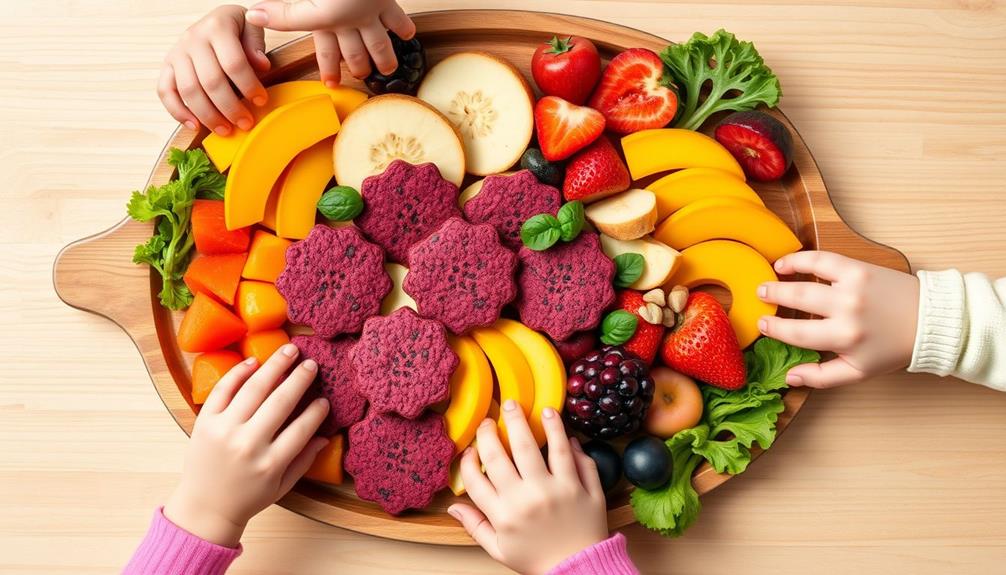
When it comes to choosing snacks for toddlers, nutritional benefits play an essential role in their growth and development. Organic beetroot biscuits are a fantastic option that packs a punch of essential nutrients like fiber, iron, and antioxidants. These nutrients support healthy growth while aiding digestion, which is important for maintaining regular bowel movements and overall gut health.
Additionally, incorporating creativity into mealtime can make healthy snacks more appealing to young children, as highlighted in family activities that promote creativity.
The high fiber content in these biscuits not only helps with digestion but also keeps your little one feeling full and satisfied. Plus, organic beets are loaded with significant vitamins such as folate, potassium, and vitamin C. These vitamins are key for boosting immune function and promoting cellular health in toddlers, making beetroot biscuits a smart choice.
What's even better is that the natural sweetness from beetroot and date paste satisfies your toddler's cravings for sugar without resorting to refined sugars. By incorporating an organic beetroot biscuit into your toddler's diet, you're introducing them to vegetables in a fun and appealing way.
This can enhance their willingness to try new foods, setting the stage for healthier eating habits as they grow.
Storage and Preparation Tips

Proper storage and preparation of your toddler's beetroot biscuits can assure they remain delicious and nutritious. To guarantee ideal cleanliness and safety, consider using professional cleaning services for your kitchen before cooking.
Store your beetroot biscuits in airtight containers at room temperature for up to three days. If you want to extend their freshness, refrigerate them for a few more days. For longer storage, freeze the biscuits in well-sealed containers to prevent freezer burn; they can last up to three months. When you're ready to serve, simply reheat the frozen biscuits in the oven to restore their original texture and taste.
To prepare beet puree, roast beets until tender, peel them, and blend with other fruits or vegetables for a nutritious addition to your toddler's meals.
Store your homemade beet puree in airtight containers in the refrigerator for up to five days. For convenience, freeze the puree in ice cube trays, allowing you to easily portion out servings as needed.
Shipping and Return Information
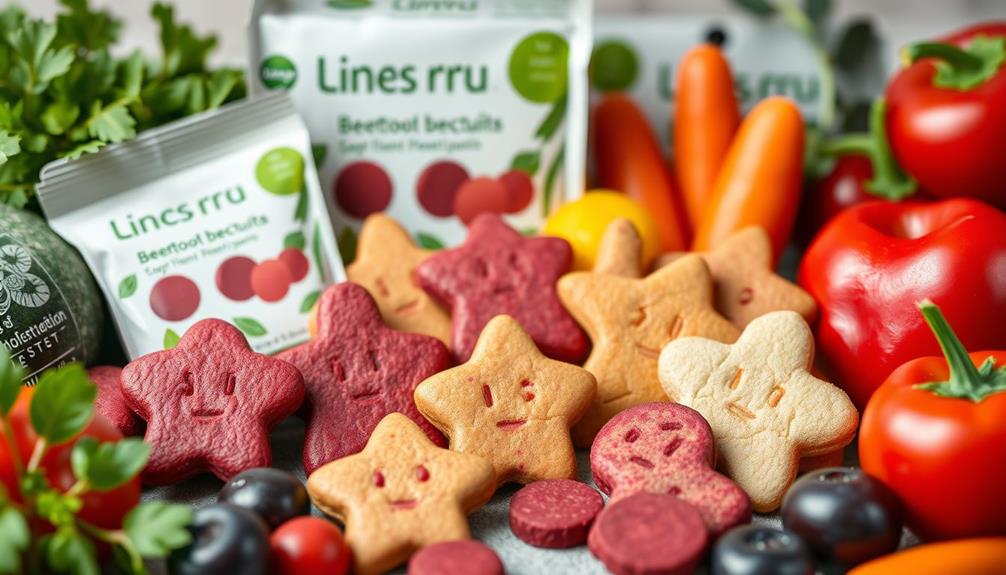
When you order Good & Gather's organic beetroot biscuits, your order gets processed within 1-2 business days, so you won't have to wait long.
Additionally, using a home security system can provide peace of mind while you await your delivery, allowing you to enjoy your treats without worry necessity of home security systems.
You'll receive tracking information to keep tabs on your shipment too.
If you need to return an item, you have 30 days for damaged products or unsatisfactory expectations, giving you peace of mind with your purchase.
Order Processing Timeline
Orders for beetroot biscuits are handled swiftly, with processing typically completed within 1-2 business days. This efficient order processing timeline guarantees you won't be waiting long to enjoy these healthy snacks.
Once your order is processed, shipping times may vary depending on your chosen delivery method and location. This flexibility helps you plan when to expect your tasty treats.
You'll receive tracking information as soon as your order ships, allowing you to monitor its progress until it arrives at your doorstep.
To keep your beetroot biscuits fresh, store them in an airtight container once you open the package. This helps maintain their delicious flavor and texture for longer.
If you ever face any issues with your order, rest assured that we're here to help. While we won't delve into return policy details just yet, know that we prioritize your satisfaction.
Our goal is to make your shopping experience smooth and enjoyable, so you can focus on what really matters—providing your toddler with colorful, healthy snacks. Enjoy the journey of discovering delightful flavors that both you and your little one will love!
Return Policy Details
We want you to feel confident in your purchases, so our return policy is designed with your satisfaction in mind. If you receive any damaged products, you can return them within 30 days for a full refund, provided the items are unused and in their original packaging. This guarantees you get only the best for your little ones.
For exchanges, you have 14 days from the purchase date with proof of payment. We recognize that sometimes things don't meet your expectations, and we're here to help.
If you choose to return items, you can conveniently do so either in-store or by mail, giving you flexibility in how you handle your return.
Once we receive your returned items, we process refunds within 30 days, making the experience as smooth as possible.
Shipping times for your orders typically range from 1-2 business days, and we provide tracking information to keep you updated on the status of your shipment.
With our return policy, you can shop with peace of mind, knowing that your satisfaction is our priority.
Customer Reviews and Feedback
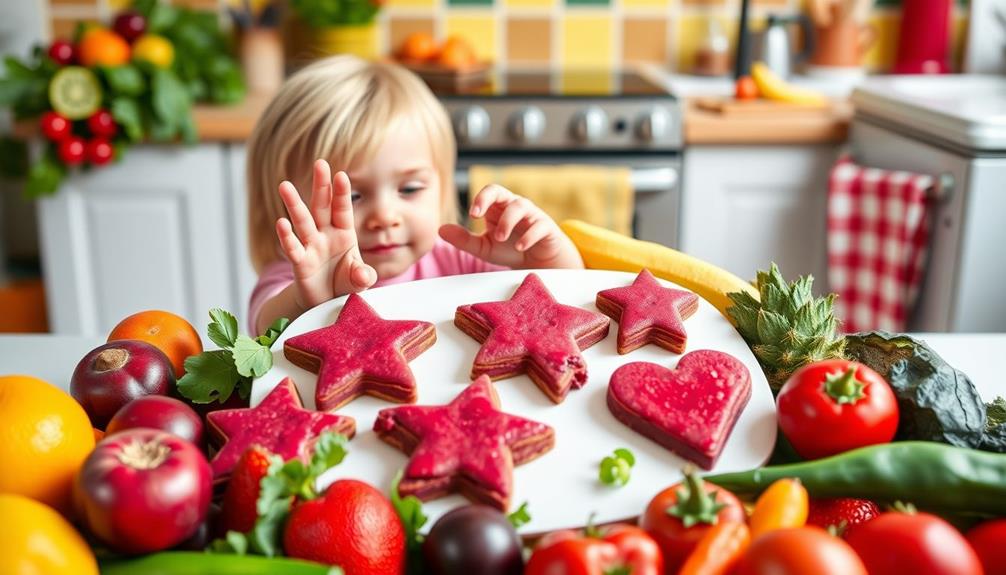
When you read customer reviews, you'll notice that many parents rave about the tasty flavor and crunchy texture of Good & Gather's beetroot biscuits.
Many also appreciate the importance of healthy snacks, similar to how dog owners prioritize dog health and nutrition for their pets.
The convenient resealable packaging makes it simple to take these snacks on the go, ensuring your toddler always has a healthy option available.
However, some feedback raises allergen awareness, which is essential for making safe choices for your little one.
Taste and Texture Praise
Parents rave about the delightful taste and satisfying crunch of Organic Beetroot Biscuits, making snack time an enjoyable experience for toddlers. Many reviews highlight the biscuits' crunchy texture, which keeps little ones engaged and happy while munching away.
The vibrant color of these beetroot biscuits not only catches their eye but also piques their interest in healthier options. You'll appreciate that the natural sweetness from organic beet powder and maple syrup makes it easier for toddlers to accept vegetables in their diet.
Feedback consistently indicates high satisfaction with the flavor, as parents love that these biscuits are free from artificial colors and flavors, providing a guilt-free snacking choice.
Moreover, customers often mention how the appealing taste encourages their children to reach for these biscuits over less nutritious options. The combination of crunchy texture and delicious flavor truly makes these snacks a hit in your household.
With parents sharing glowing reviews, it's clear that Organic Beetroot Biscuits are a fantastic way to introduce healthy snacks to your toddlers while ensuring they enjoy every bite.
Packaging Convenience Highlights
Many customers rave about the convenience of Good & Gather's beetroot biscuits, particularly praising the resealable packaging that keeps snacks fresh and ready for on-the-go munching.
This lightweight 5oz pack easily fits into your diaper bag or lunch box, making it a perfect travel companion. Parents appreciate how the sturdy design prevents breakage, ensuring that the biscuits arrive intact, no matter where you're headed.
The visually appealing packaging captures toddlers' attention, encouraging them to enjoy these healthy snacks.
You'll find that the clarity of ingredient information on the packaging allows you to make informed choices for your little ones.
This packaging convenience is a standout feature that many reviews highlight, as it simplifies snacking during outings.
Allergen Awareness Concerns
Allergen awareness is a top priority for parents selecting snacks for their toddlers, and customer reviews reflect this concern. Many parents express worries about potential allergens, such as nuts and gluten. They appreciate that the beetroot biscuits are free from these common allergens, offering peace of mind for those with children who've food sensitivities.
Feedback consistently emphasizes the importance of clear labeling on packaging regarding allergens. Parents want to quickly identify safe options without searching through complex ingredient lists or guessing what's inside. Good & Gather meets this need by highlighting its commitment to clean ingredient lists and the absence of artificial flavors and colors, aligning perfectly with many families' preferences.
While the beetroot biscuits generally receive positive reviews, some parents still desire more allergen-friendly options in the toddler snack category. This feedback underscores the need for brands to expand their offerings to accommodate varying dietary needs while maintaining allergen awareness.
Creative Snack Ideas
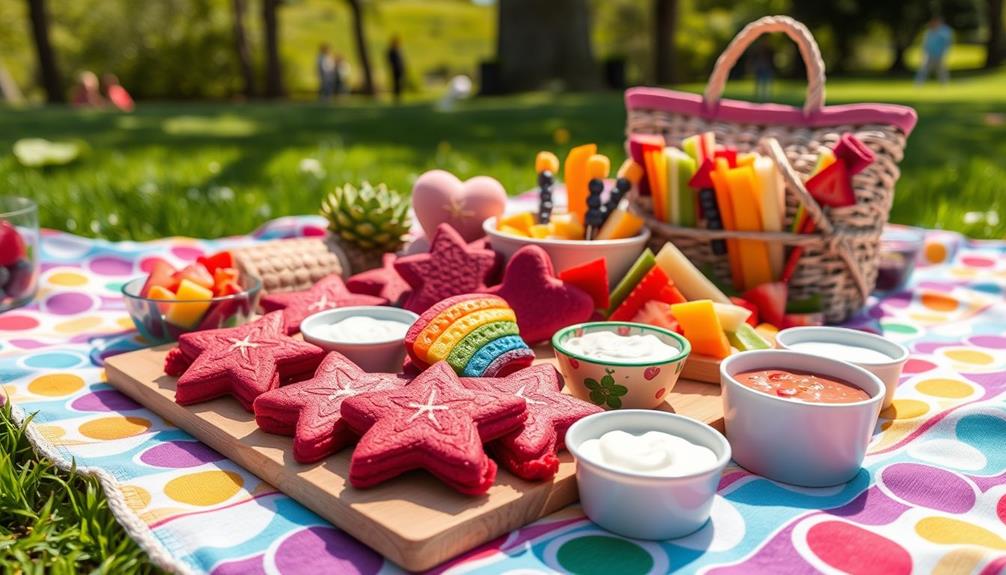
Creative snack ideas can transform mealtime into an exciting adventure for your toddler. Start with beetroot biscuits, which you can pair with yogurt or hummus for a nutritious and fun dipping experience. This encourages your little one to explore new flavors while enjoying a healthy treat.
You can also incorporate beetroot puree into smoothies, blending it with sweet fruits like bananas and mangoes. This creates a vibrant, tasty drink that packs a nutritional punch. Additionally, engaging in mealtime can enhance social skills through cooperative play, making it a wonderful opportunity for bonding.
For a hands-on experience, create colorful vegetable rolls using beetroot wraps filled with cream cheese and diced veggies. This engaging way to enjoy greens will have your toddler excited about their meals.
You can also get creative by crumbling beetroot biscuits over yogurt or oatmeal, adding texture and visual appeal to breakfast.
Lastly, use beetroot as a natural food dye in pancake or muffin batter. This not only makes these treats visually exciting but also enhances their nutritional value.
With these creative snack ideas, you'll make healthy eating fun and enjoyable for your toddler, paving the way for a lifetime of positive food experiences.
Exploring Other Healthy Snacks
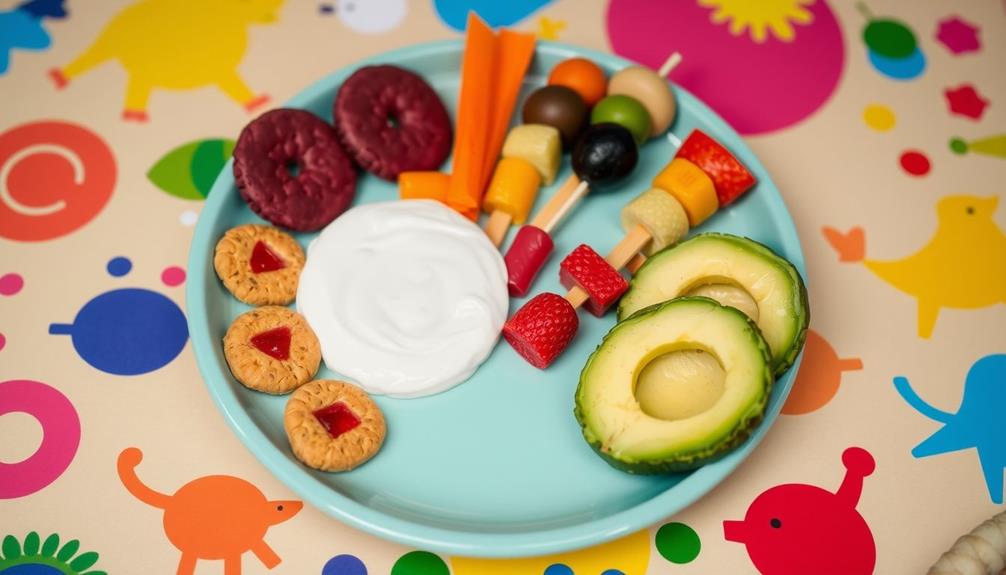
What healthy snacks can you introduce to your toddler to guarantee they're getting the nutrients they need? Start by offering organic fruit-based options like apple slices or banana chips, which provide essential vitamins without any added sugars or artificial ingredients.
Whole grain snacks, such as oatmeal bars or rice cakes, are also fantastic choices, delivering fiber and nutrients that support your toddler's growth and development. Incorporating mindful eating practices can help instill healthy habits early on.
Don't forget about vegetable-based snacks. Carrot sticks paired with hummus or sweet potato chips can make veggies fun and tasty, while ensuring your child receives important nutrients and antioxidants.
For a dairy boost, yogurt mixed with fresh fruit or simple cheese sticks supply calcium and protein essential for strong bones.
If you need nut-free alternatives, consider chickpea puffs or lentil crackers. These crunchy snacks not only satisfy your toddler's cravings but also cater to dietary restrictions.
Frequently Asked Questions
How to Feed Beets to a Toddler?
To feed beets to your toddler, start by offering them in a pureed form for easier digestion.
You can mix the pureed beets with familiar flavors like applesauce or yogurt to make them more appealing.
Try incorporating beets into dips or spreads, which can enhance their interest in new tastes.
Always watch for any allergic reactions when introducing beets, and consult your pediatrician for guidance on serving sizes to guarantee safety.
What Are Healthy Snacks for Toddlers and Babies?
Picture a vibrant plate filled with tiny, colorful bites: pureed fruits gleaming like jewel-toned treasures, whole grain crackers that crunch delightfully, and creamy yogurt that swirls into a tempting treat.
You can choose snacks that are low in sugar and free from artificial ingredients, nurturing your toddler's health.
Think of small, manageable portions that invite self-feeding, ensuring every bite is safe and enjoyable, supporting their growth and making mealtime a joyful adventure.
Conclusion
To sum up, beetroot biscuits and beyond offer a delightful, nutritious way to nourish your little ones. By choosing colorful, healthy snacks, you're fostering fantastic habits that'll last a lifetime. Remember to store them smartly and explore exciting options to keep snack time fun and flavorful. So, step into the world of vibrant veggies and creative cuisine, and watch your toddlers thrive on these tasty treats. Snack time can truly be a colorful culinary adventure!










